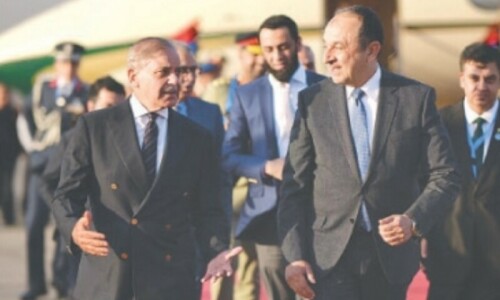LONDON, Oct 20: Nato members are wavering in their political commitment to Afghanistan, one of the alliance’s top commanders said on Monday, describing the near seven-year campaign against the Taliban as disjointed.
Pointing to more than 70 “caveats” that give individual countries a veto over certain operations, and the fact that troop commitments remain unfulfilled, General John Craddock said he was fearful the operation was being short-changed.
“We are demonstrating a political will that is in my judgment sometimes wavering,” Craddock, a US general and Nato’s Supreme Allied Commander Europe, said in a speech to policymakers and defence analysts in London.
“It’s this wavering political will that impedes operational progress and brings into question the relevance of the alliance here in the 21st century,” he said.
Nato troops serve in Afghanistan under a United Nations mandate. That mandate initially limited their operations to Kabul, but in 2003 was expanded to give Nato a wider role to support the Afghan government throughout the country.
As insecurity has increased in Afghanistan – this year is the most deadly since the conflict began in 2001 – Nato troops have steadily been drawn into more deadly operations, a factor that has dissuaded some nations from deeper involvement.
Craddock defended the view expressed by Britain’s outgoing commander in Afghanistan, Brigadier Mark Carleton-Smith, that the Taliban could not be defeated militarily and that at some level militants needed to be drawn into a dialogue.
“His comments are generally in line with what our military and political leaders have been saying all along... The conflict in Afghanistan cannot be won by military means alone,” Craddock, who serves as Nato’s operational commander, said.
“We in the international community must come together as part of a truly comprehensive approach (in Afghanistan). The current effort remains disjointed in time and space.”
Addressing Pakistan, Craddock emphasised the need for close cooperation with its security forces and appeared to defend the US military’s policy of pursuing militants across the border into Pakistan, saying self-defence was paramount.
He also said he believed there had been an increase in foreign fighters in Afghanistan, but did not say from where or how many. Many Taliban are Pukhtun tribesmen from Pakistan.—Reuters











































Dear visitor, the comments section is undergoing an overhaul and will return soon.